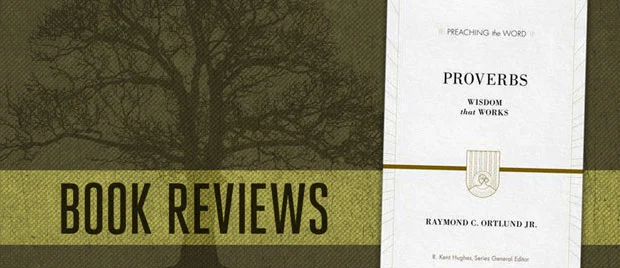Proverbs: Wisdom that Works

So far, half of the Bible's sixty-six books have been covered in Crossway's Preaching the Word series of commentaries. The commentaries are all written by pastors, and the chapters read like sermons—good sermons, that is. Typically, each of these commentaries works systematically through a book of the Bible in sermon-length chapters. Each chapter explains the text, points out the message to its original audience, demonstrates how it fits into the overall story of God's work of redemption, and centers around Christ. In faithful pastoral fashion, each chapter also draws at least one application for today's audience from the text and builds a natural bridge from the text to the gospel.
In Proverbs: Wisdom that Works, Raymond C. Ortlund, Jr. has a bit of a challenge. Anyone who has ever read Proverbs understands why. Many chapters of Proverbs are made up of one stand-alone saying after another. The sayings are usually only two lines in length. How would you preach a series of sermons on Proverbs?
Ortlund does it like this: where he can (Proverbs 1-9), he moves through the book in the typical, systematic fashion an expositional preacher would use to preach through any book. These first nine chapters of Proverbs are introductory and written in paragraphs. They stress the value of wisdom and the character required to pursue it with diligence. They warn of the devastation sure to come in the end for anyone who chooses folly. From chapter 10 on, the Proverbs are those wonderfully pithy wise sayings, sometimes arranged loosely by topic, but not very often. So after finishing with the first nine chapters, Ortlund chooses seven of the main themes addressed by Proverbs, themes he had not yet discussed at length, and writes a chapter for each. The seven themes he chooses are the tongue, humility, family, emotions, friendship, money, and life and death.
At the outset, Ortlund announces that "the book of Proverbs is a gospel book, because it is part of the Bible." All the way through, he shows us how Proverbs and the gospel are inextricably tied together. The proverbs are intended as instructions of a loving Father to his children. If we aren't God's children through faith in Christ, we won't be able to follow those instructions. If we are God's children, we will hunger to do just that.
Ortlund clues us in, through non-technical prose, on literary matters that enhance our understanding of the author's message. For example, most children growing up in homes where the Scriptures are taught know about the six things God hates, described in Proverbs 6. What I had not realized until reading Proverbs: Wisdom that Works is this: the six things in verses 16-19 build on the description of "the worthless man" in verses 12-15. The climax of the worthless man's description comes in this: he is "continually sowing discord." Verses 16-19 go on to explain why the man who sows discord will come to a disastrous end: God hates what he's doing. Ortlund explains that a literary device is being used in this list. When writing "there are six things the Lord hates, seven that are an abomination to him," the author is drawing attention to that seventh thing as the most important. What's the seventh thing in the list? "One who sows discord among brothers." The other six things simply show ways in which he sows that discord. Therefore, rather than this passage being a description of a certain kind of bad character ("the worthless man"), followed by a list of random things God objects to, it's actually a powerful passage stressing the importance to God of unity among his people.
Ortlund points out that two kinds of persons continually mentioned or addressed in Proverbs are the scoffer or the fool, and the simple or the naive. "The fear of the Lord is the beginning of knowledge," Proverbs tells us early on, "but fools despise instruction." This is key, Ortlund says. The person for whom there is no hope is the fool who despises instruction, the scoffer who believes no one can tell him anything he needs to know, the one who will not bend the knee to Christ and acknowledge his need. The simple, on the other hand, may end up as a scoffer, but, at the moment, there is still hope for him. The simple person is the one who has not committed himself to wisdom. Ortlund writes that the word is related to a Hebrew word meaning "to be open." But, he warns, with the same urgency that Lady Wisdom uses when calling to the simple, we cannot remain uncommitted and go on in the way of wisdom. Over and over through his commentary, the author urges us to commit ourselves without reserve to the gospel, to "walking further with Jesus than we've ever gone before..."
Time and again, I found myself convicted of my lack of seriousness in my pursuit of Christ as I read Proverbs: Wisdom that Works. Each day, we must begin anew in our pursuit of wisdom, in our attachment to Christ. "We feel disqualified," Ortlund writes, "and we are. But that is not a deal-breaker for God. With him, there is only one deal-breaker: 'The complacency of fools destroys them' (Proverbs 1:32). You do not need to hate Jesus to waste your life. You only need to be okay with how you are."

